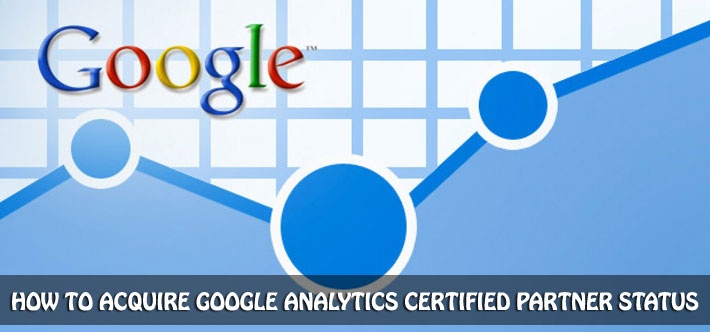
Having been working in the field of internet marketing for quite a while, our team got used to relying on facts and real data before giving any recommendations to our clients.
Only after thorough analysis of the current situation and after drafting a series of thought-through hypothesis on how to improve the situation any quality management, curation and evolution of the project is possible.
The tool used to analyze online projects has always been Google Analytics. Depending on the kind of task set (curate the PPC campaign, implement all the tracking necessary, promote the project wisely by means of SEO, manage the multi-channel marketing activities and attribute the conversions correctly, improve site’s conversion rate), – all sorts of GA fine-tuning is required.
Being rather enthusiastic and passionate GA users we have decided to challenge the process of acquiring GACP status.
Besides pure emotional reasons we were also driven by these two reasons: firstly, we wanted to get an official acknowledgement by Google themselves of our expertise and secondly, we saw lots of yummy bonuses listed which certified Analytics partners can claim. GACP status gives its holder he access to beta-functionality of GA, also you get a unique opportunity to consult on complicated issues directly with managers of GA product. Well, having enough reasons to want this status badly, we have set ourselves on it.
The Process
So how exactly was it step by step.
We need to download the questionnaire from the site – it has all the terms and conditions of the process of application and the list of necessary documentation detailed.
The structure of the questionnaire:
1) The info about the company: name, street address, history, company structure, size, clients. Formal and officially confirmed data is required.
2) Requirements of the program: list of analytics services, the company provides, links to the pages that describe those services, rates and prices. Here we describe what kind of analysis is available in our company how much we charge for them and provide the links to prove our words.
3) The process of implementation of the analytics: here you have to describe in detail, how you take decisions to investigate something in your company, which methods you use, how you check the correctness of the data collected, what you do with that data. So you have to explain how exactly the process of analysis is built in your company. At this point it’s important for you to understand why you are doing this – because Googlers need to be sure that if some specific people leave the company the whole process of providing quality analytics services with a help of GA won’t stop and won’t get ruined. Meaning that this process is well structured and tuned and it does not depend on specific people. Here we have described how the processes work separately in each department that works with GA: SEO, SEM and UX.
4) Overall level of expertise in the company: here you need to detail what kind of blogs you curate, analytical articles you write, how you share your knowledge with others and how you promote the usage of GA within your community – which events both offline and online you host, meaning seminars, webinars, training courses etc. Here you would also want to list all the team memebers who have attained the GA IQ certificate.
In our company we had for the moment 32 GA certified individuals, some of them retook the exam for a couple of times already even. I mean that GA IQ expires in 18 months, so when you file the list of GA IQ holders list make sure they all have active status. Besides, here you need to specify if you have specialists that possess practical knowledge of JavaScript, Flash, Ajax, Html and etc. At this point Googlers need to be sure that in case any project requires custom code implementations and sophisticated code tuning you have the required skills to do that.
Now we move to the main bulk of work. You need to submit 3 case studies showcasing your work for real customers. Each of them should contain the following information (view sample):
1) General info about the client: URL, contact details, GA account ID, brief description of their business. It is important to get your client’s approval to use their data and to pass it to, because there is a real chance that Google will call them back to check whether you have actually done the scope of work in the case study. But in our case, nobody actually bothered our clients, to the best of our knowledge.
2) Technical details of the case study: here you need to describe in detail how exactly you analyzed, what metrics used to collect statistics, how you organized the collection of statistics, whether you used API, how you checked that it was going well. It is a very good idea to show here the use of custom, sophisticatedly tuned codes of GA. Actually, the meaning of this part of the application is precisely to show the guys from Google that you know GA at the highest level and make the most of all its ability to meet the client’s goals, even if these opportunities do not lie on the surface.
3) Analytical details of the case: this part should show how using the statistics from GA you solve the problems of your client, how the data helps you improve customers’ business. Here we explained our first hypothesis, which we built offering improvements to our customers, and subsequently interpreted the results obtained during the experiments on the site.
4) Business details of the case: and here comes the time of figures. We describe how much the situation has improved after the implementation of our recommendations; calculate how profitable it was for the customer, if he followed our advice.

You have to create three case studies in the format described above.
After collecting all the necessary data, we have sent the questionnaire to Google for consideration. Next you only need to wait for a response and pray. Nobody here makes any promises and exact estimates, how fast your application will be considered depends solely on the managers of Google Analytics Partnership program in California. And, yes, it is important to point out that you can get certified as the partner agency in the country where your company is located, but you will still have to take your interview with Google main office in California, USA. As only those guys are authorized to give out GACP statuses.
Tedious waiting lasted for three months for us and finally we have received such an answer: “Guys, you rock, you have a good application, but we would like to see more case studies.”
Here began the next stage of the work: we have prepared 4 more case studies in the same format as before, focusing on cases of non-standard GA code implementation and usage. The main goal was to prove that we really know properly all the hidden features of GA and can implement them well.
After additional case studies had been sent to Google too, we were contacted by the manager of the company to appoint a telephone interview. On our side, we had 6 people participating in the conference call with a Google manager. There is no restrictions on the number of your team members who can participate in the call, you can take all the people you involved in the process to prove that your team really is efficient and professional GA experts. Our interview lasted for about 90 minutes. Google’s representative asked us general questions about our company, its structure, how many people work with GA daily, once again we were asked to walk them through the process of analysis in larger detail, how exactly we usually get those requests and how we handle them. Then we discussed some of the cases we had sent to Google and we had to answer some advanced questions on possibilities of Google’s recent analytical products such as GA Universal and the Tag manager.
As a result, a week later we received a letter with congratulations, which said that we successfully acquired the GACP status and we only had a couple of forms left to fill in with the formal data. Hooray! We are the champions!
What we got with the GACP status.

Besides the official badge and a free backlink from Google, GACP membership gives you access to a lot of interesting content.
You get access to special top secret;) Partner Google Groups and Forum, which host a variety of discussion topics. You can get the answer to any question that bugs you about GA first-hand.
You get the access to beta-testing of the newest functions in GA, you can test, surf through and ask questions if anything is unclear.
Also you get access to regular training webinars, participation in which is absolutely free.
Number of available data is simply huge. Also you will get the opportunity to attend partner conferences and seminars by Google in the USA.
Overall, the whole process of obtaining the status of GACP took us almost precisely 12 months, 10 people were involved with this process to some extent and one person was in charge of the entire process, acting as the project manager. As a result, we received an official confirmation from Google that we really are the experts in analytics using the data from GA!
Opinions expressed in the article are those of the guest author and may not reflect the views of Webaholic.
About the Author: MARINA RYASHCHIKOVA, HEAD OF USABILITY/UI AT PROMODO, CERTIFIED GOOGLE ANALYTICS EXPERT. More than 5 years of experience in usability and UX design including conversion rate optimization, A/B and multivariate testing, Google analytics. Lead the usability audit and conversion rate optimization for major retail companies in Eastern Europe: Mobilluck, Deka, Bookzone, ABC Sport, Bagstore.

